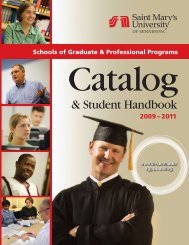PDF version - Saint Mary's University of Minnesota
PDF version - Saint Mary's University of Minnesota
PDF version - Saint Mary's University of Minnesota
Create successful ePaper yourself
Turn your PDF publications into a flip-book with our unique Google optimized e-Paper software.
Biology<br />
B301 Ecology with Laboratory 4 credits<br />
A study <strong>of</strong> the theoretical and practical ecological concepts pertaining to species, populations,<br />
communities and ecosystems; stress is placed on the concepts <strong>of</strong> energy flow, nutrient cycles, limiting<br />
factors, population dynamics and succession. Laboratories include both theoretical and practical<br />
applications <strong>of</strong> concepts as well as some plant and animal identifications. Three class meetings and one<br />
three-hour laboratory/field trip each week. Offered fall semester. Prerequisites: B110/111 and B120/121.<br />
B305 Human Anatomy with Laboratory 4 credits<br />
This course explores the design and structure <strong>of</strong> the human body. Lectures present cellular and<br />
histological features <strong>of</strong> the body systems. Laboratory dissections explore gross anatomic features and<br />
the three dimensional relationships <strong>of</strong> structures particularly relevant to the health sciences. Body<br />
structures forming superficial features, those visualized by diagnostic imaging techniques and those<br />
relevant to kinesiology are empathized. The class meets for two lectures sessions and two two-hour labs<br />
weekly. Offered fall semester. Prerequisites: B110/111 and B120/121.<br />
B306 Medical Terminology 2 credits<br />
This course is an organ systems approach to learning and understanding medical terms. A wordbuilding<br />
programmed learning format is utilized to understand Latin and Greek prefixes and root words<br />
from which our English medical words originate. Common medical abbreviations and case studies are<br />
also incorporated into the course. The class meets for two discussion periods weekly.<br />
B310 Genetics with Laboratory 4 credits<br />
The principles underlying hereditary variation in living organisms are the focus <strong>of</strong> this course. These<br />
topics are centered about the transmission <strong>of</strong> hereditary traits, cytogenetics, basic gene concepts,<br />
introductory molecular biology, population genetics, and the genetic basis <strong>of</strong> evolution. Three class<br />
meetings and one three-hour laboratory period each week with several laboratory periods replaced<br />
with a one-hour lecture/discussion. Offered spring semester. Prerequisites: B110/111 and B120/121.<br />
B311 Cell Biology with Laboratory 3 credits<br />
This course is a study <strong>of</strong> the cell at the ultrastructural, biochemical, and physiological levels. Special<br />
consideration is given to respiration, photosynthesis, secretion, cytoskeleton, cell cycle, cell growth,<br />
movement, membranes, and other organelles. Two lectures and one three-hour lab weekly with two<br />
laboratory periods replaced with a one-hour lecture/discussion. Offered fall semester. Prerequisites:<br />
B110/111, B120/121, and C321 (C321 may be concurrent).<br />
B313 Physiology with Laboratory 4 credits<br />
This course explores the functions <strong>of</strong> the body systems <strong>of</strong> humans. The interrelationships <strong>of</strong> organsystems<br />
processes to maintain homeostasis are emphasized. Laboratory sessions provide experiences<br />
with procedures and instrumentation to gather data that highlight the function <strong>of</strong> the body systems.<br />
Course topics are particularly relevant to the health sciences. The class meets for three lectures and one<br />
three-hour lab weekly. Offered spring semester. Prerequisites: B110/111 and B120/121. Recommended:<br />
C142/144.<br />
B315 GIS Theory and Applications with Laboratory 2 credits<br />
The first half <strong>of</strong> this course introduces the basic concepts necessary to an understanding <strong>of</strong> geographic<br />
information systems (GIS) including their purpose, hardware, s<strong>of</strong>tware, data bases, and applications.<br />
Special attention is paid to the concept <strong>of</strong> map projections, coordinate systems and georeferencing<br />
data. The second half introduces and spurs the development <strong>of</strong> core competencies with the desktop<br />
GIA Arcview. Students learn how to conduct queries, undertake simple and complex spatial analyses<br />
and develop presentations, incorporating views, charts, and images, among others. Two lecture/minilaboratory<br />
periods per week. Offered spring semester.<br />
62
















